Tony Reeler is co-convener of the Platform for Concerned Citizens and consultant senior researcher at the Research and Advocacy Unit.
When Zimbabwe enters the pre-election circus, usually two years before elections are due, and the Afrobarometer produces a survey, the only interest the survey generates is in the estimates of which political party is the most popular.
Generally everyone ignores the rest of the data in the survey, data that can inform a more robust political economy analysis about what should actually happen. This is not trivial, because the political economy and the views of citizens have an intimate relationship, and it is exceedingly rare that any regime in charge of a government survives at the polls when every indicator of its performance suggests abject failure.
For example, in 2012, the Research and Advocacy Unit (RAU) pointed out that there were three factors that should predict Robert Mugabe’s loss in the 2013 poll, factors that operated in a number of other African countries: the popularity of the incumbent, the age of the incumbent, and the extent to which a country was dependent on international opinion, measured by the extent to which the country was dependent on more than 12% of GDP. Based on this theory, Mugabe and Zanu-PF should have lost the 2013 election, but were actually returned with a massive majority.
 Robert Mugabe and Zanu-PF should have lost the 2013 election, but were actually returned with a massive majority. (Photo: Pascal Le Segretain/Getty Images)
Robert Mugabe and Zanu-PF should have lost the 2013 election, but were actually returned with a massive majority. (Photo: Pascal Le Segretain/Getty Images)
Times have changed, however, and the situation is much worse. Furthermore, Zanu-PF only held on to the presidency by a very small margin in 2018. Things are much worse for the ordinary Zimbabwean than they were in 2013, and even worse than they were in 2017, the last time Afrobarometer did a survey in Zimbabwe. The citizens’ views in the 2021 survey (see the 2021 findings here and note that it is not an opinion poll, but a social science survey) clearly express how much worse things have become and what they think about those who should be improving these.

Compare citizens’ views from 2017 with 2021 on indicators of poverty. In answer to the question, “Over the past year, how often, if ever, have you or anyone in your family gone without enough food, water, medical care, cooking fuel and cash income?”, obviously they think that things are much worse. The only indicator that did not change dramatically was access to cash income, but even this was statistically significant: 5% changes or more generally mean this change is real. This increase in perceived poverty will come as no surprise to anyone living in Zimbabwe: even the World Bank has noted that nearly 50% of Zimbabweans are “extremely poor”.
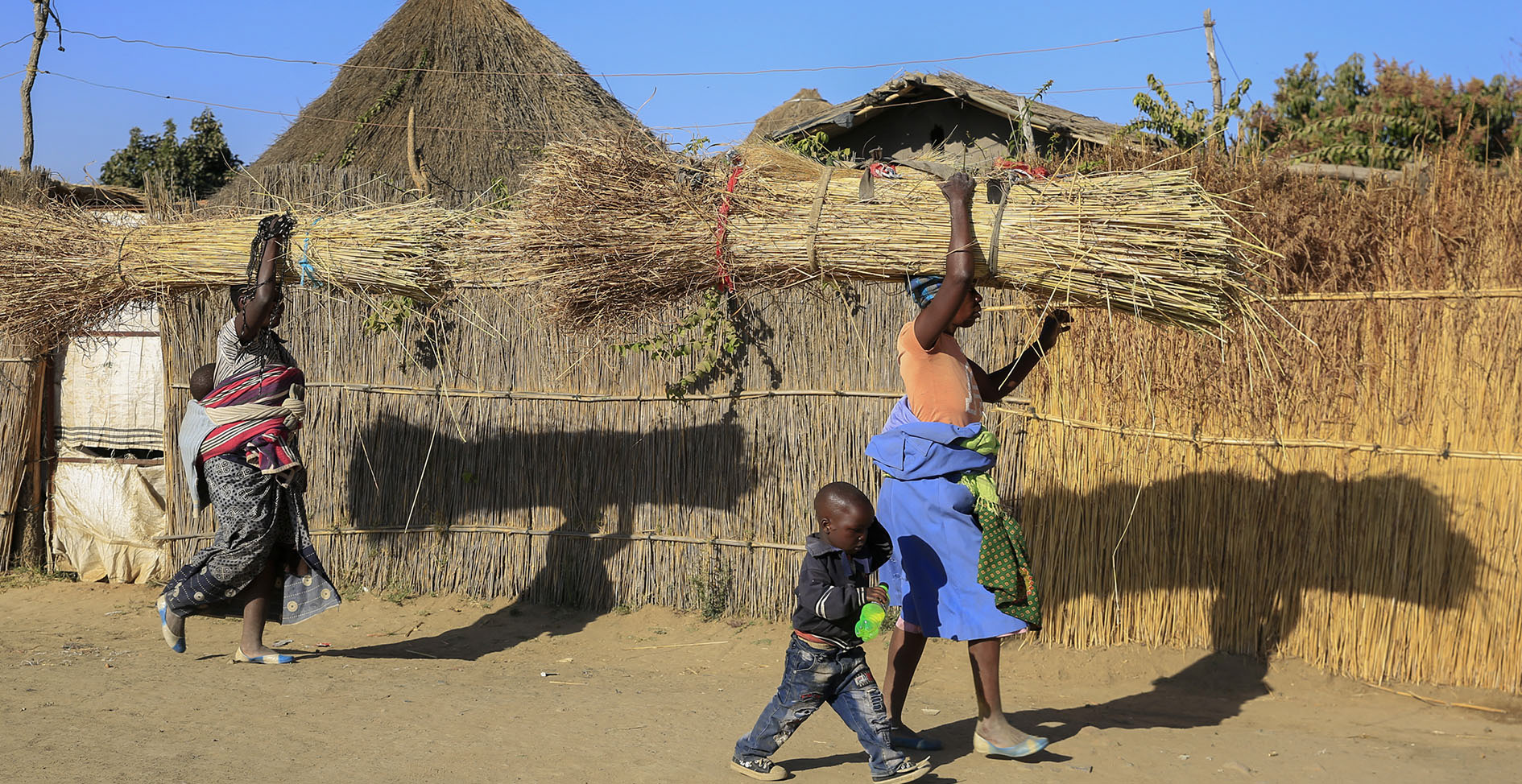 Women with children carry grass to be used for thatching in Stapleford, Zimbabwe on 2 August 2020. The grass will be sold in the community so that they will be able to fend for their families. This is a daily activity in many farming communities as families struggle to make ends meet. (Photo: EPA-EFE/AARON UFUMELI)
Women with children carry grass to be used for thatching in Stapleford, Zimbabwe on 2 August 2020. The grass will be sold in the community so that they will be able to fend for their families. This is a daily activity in many farming communities as families struggle to make ends meet. (Photo: EPA-EFE/AARON UFUMELI)
The government repeatedly blames all of this on sanctions, but what do citizens think about how the government is coping with their misery, whether it is caused by sanctions or not?
The Afrobarometer asked a straightforward question: “How well or badly would you say the current government is handling the following matters, or haven’t you heard enough to say?”
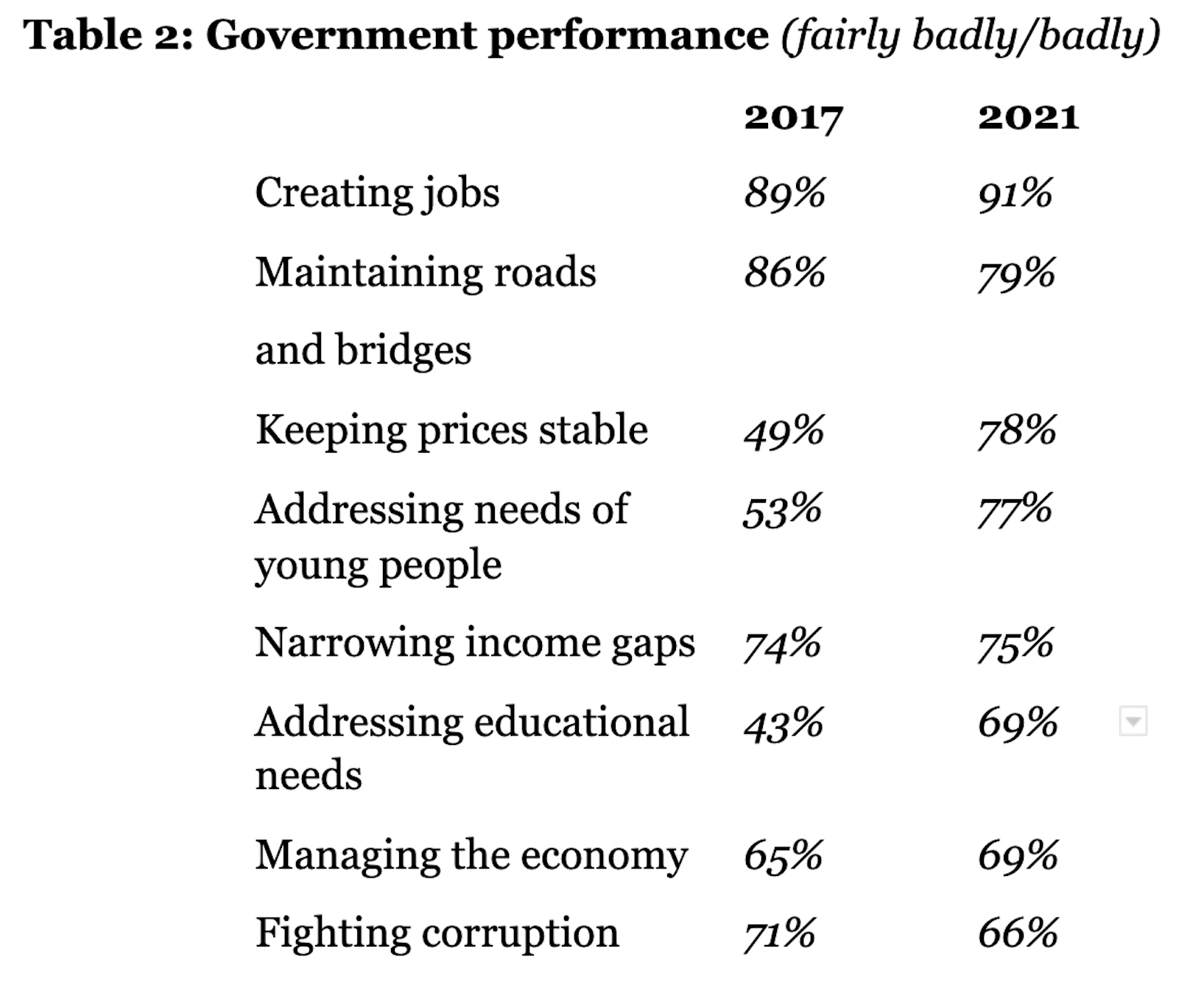
It is immediately obvious that citizens do not see any improvement in government performance, contrary to the assertions of the government. We should note, in particular, the decline in keeping prices stable, a poignant view in the light of recent data by the Consumer Council of Zimbabwe, showing that a family of six would need $480 to meet their total monthly needs. Hardly any families can meet this threshold. Most are dependent on informal activities, and thus the urban cleansing that took place in the past week can only be punishing.

(How much do you trust each of the following, or haven’t you heard enough about them to say?)
It is therefore unsurprising, in the light of the data shown above, that political trust has deteriorated more since 2017. Actually, political trust in the state has been on the decline since 2000, certainly on the back of the Economic Structural Adjustment Programme in the 1990s, and the decline in service delivery during that decade.
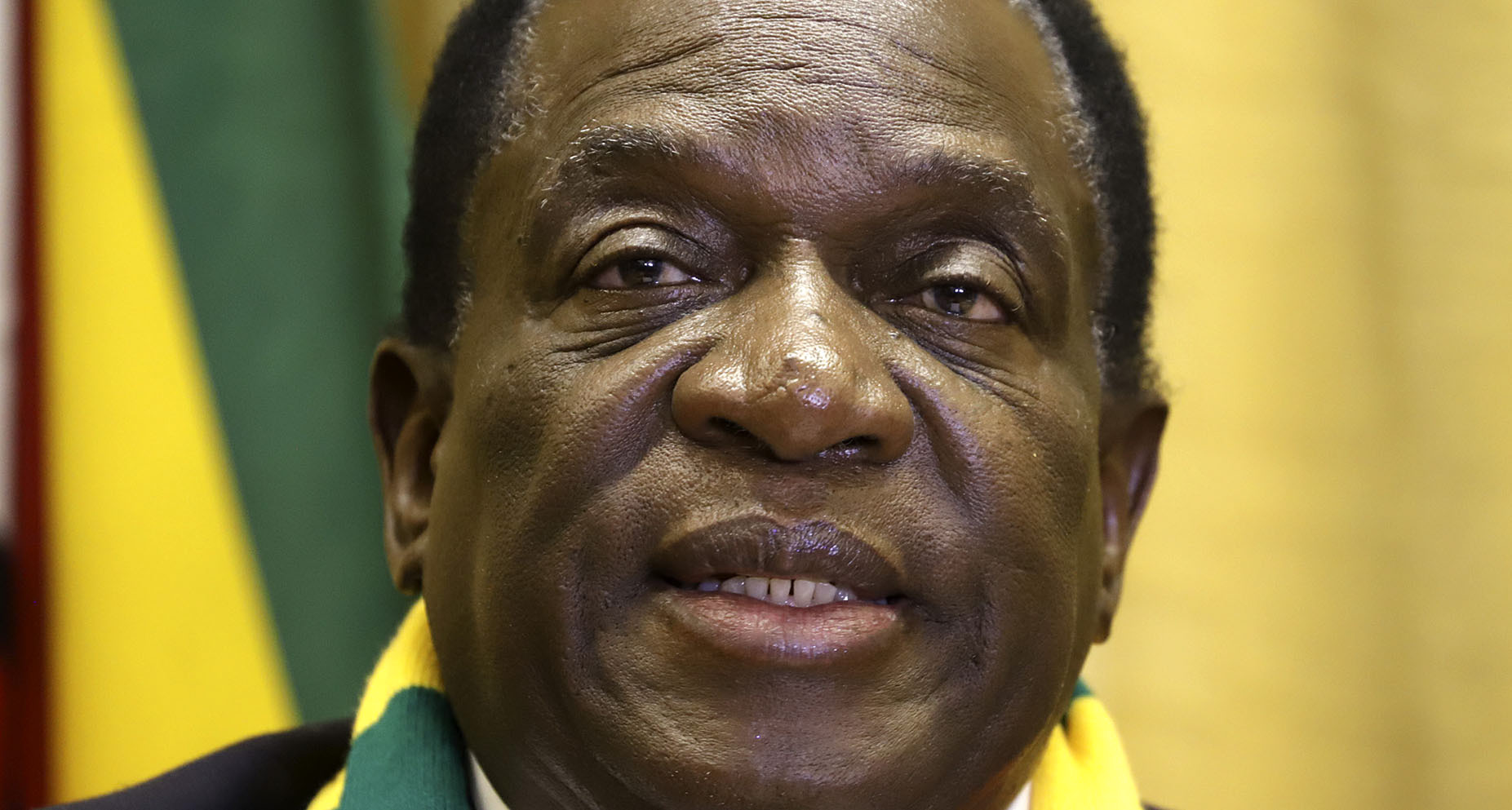 Zimbabwean President Emmerson Mnangagwa. (Photo: EPA-EFE/Aaron Ufumeli)
Zimbabwean President Emmerson Mnangagwa. (Photo: EPA-EFE/Aaron Ufumeli)
Lack of political trust is frequently diminished as a factor in public participation in favour of political fear, but there does seem to be a complex interaction between poor service delivery, lack of political trust and political fear.
It is noteworthy that NGOs are the most trusted by citizens, despite the assertion of acting Political Commissar Patrick Chinamasa that 3,500 NGOs are bent on regime change. If NGOs are more trusted than the government, even the president, and the government does not itself trust NGOs, this is very unlikely to increase political trust.
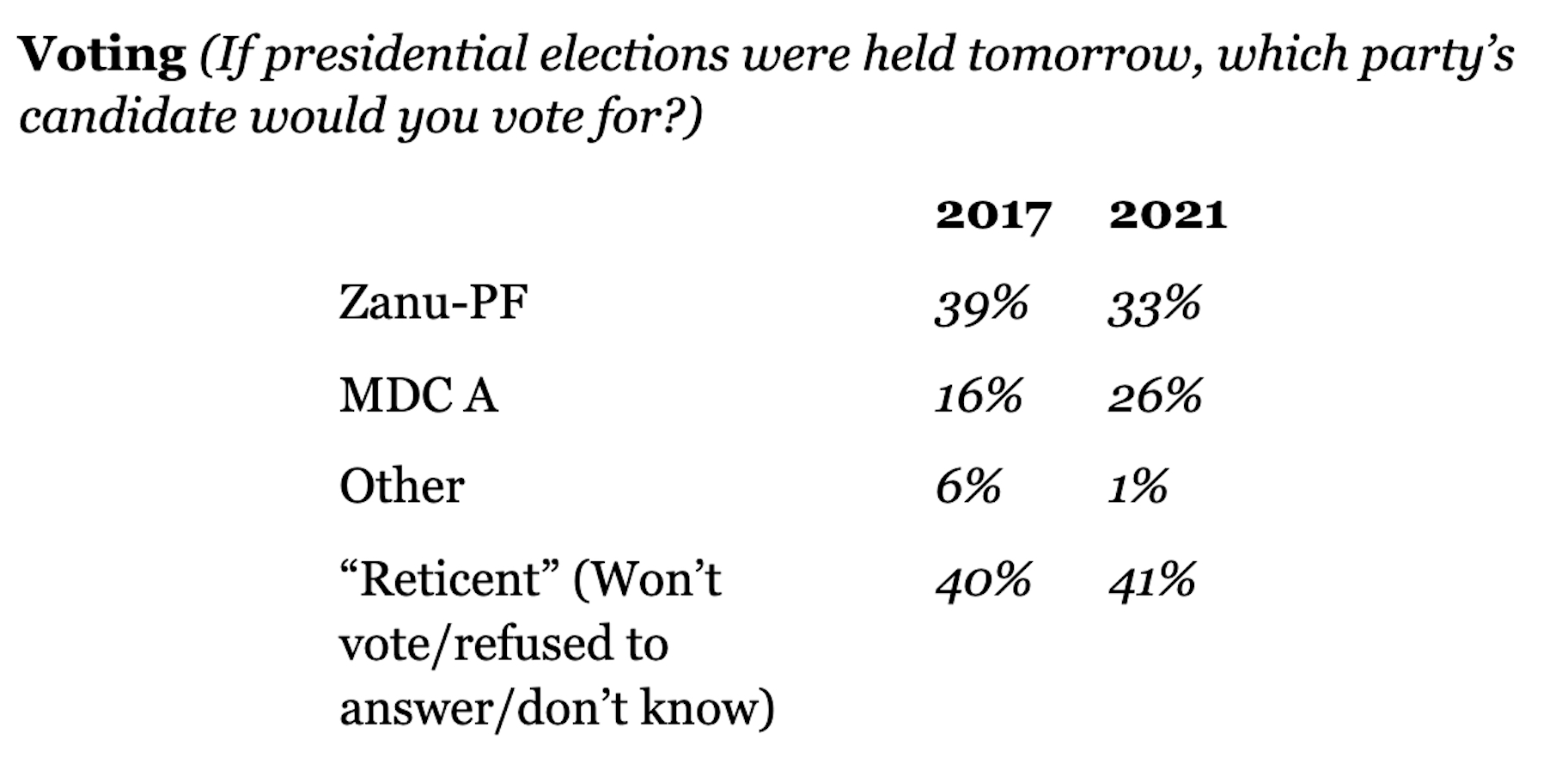
According to Afrobarometer, Zanu-PF has become less popular and the MDC more, and the percentage of uncommitted has remained stable. The big issue is what percentage of the “reticent” will vote for MDC A (Nelson Chamisa) and what percentage of the “reticent” will vote against Zanu-PF.
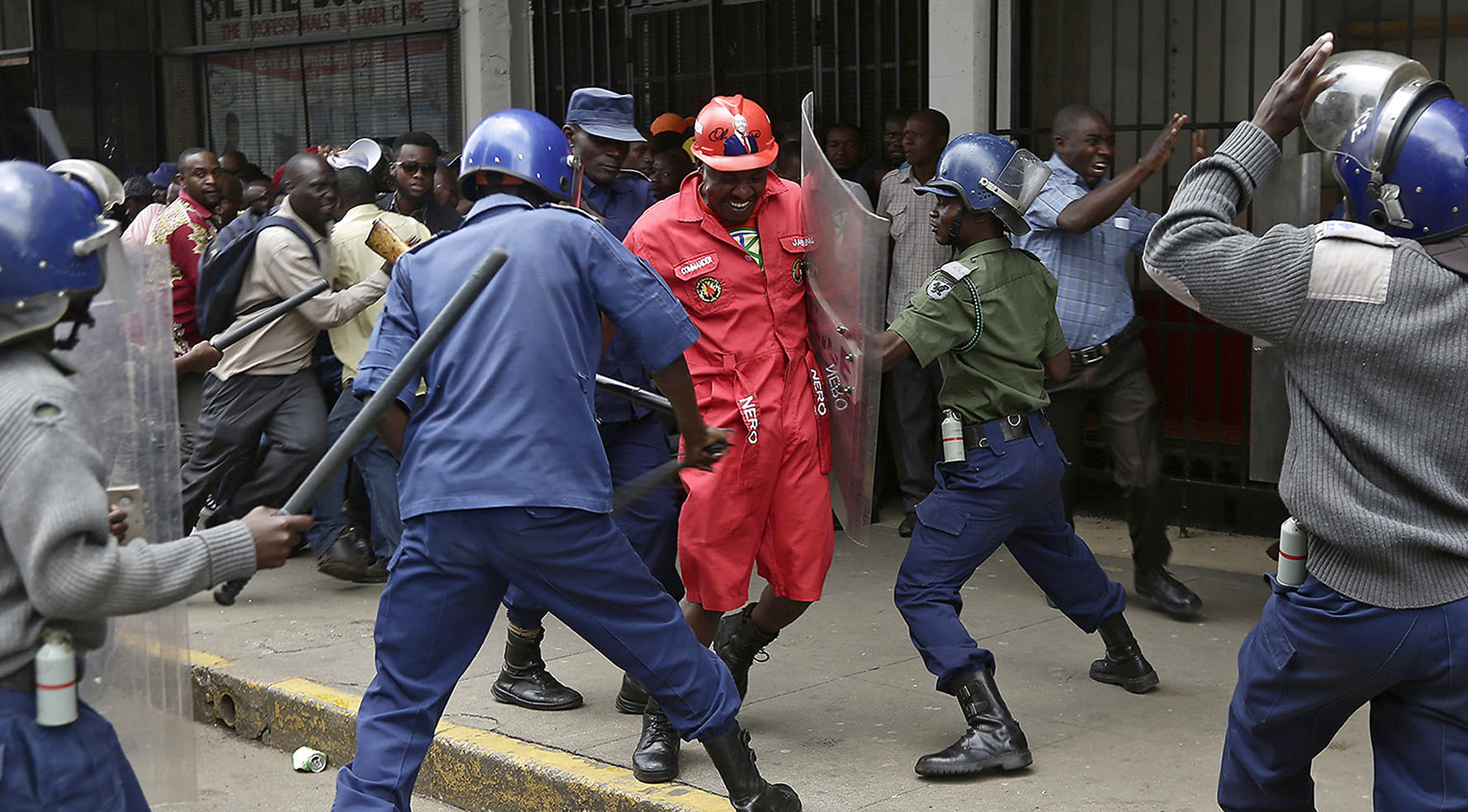 Zimbabwe Republic Police officers beat protesting Movement For Democratic Change supporters outside the party headquarters in Harare on 20 November 2019. The supporters were waiting for an address by party leader Nelson Chamisa before they were attacked. (Photo: EPA-EFE/Aaron Ufumeli)
Zimbabwe Republic Police officers beat protesting Movement For Democratic Change supporters outside the party headquarters in Harare on 20 November 2019. The supporters were waiting for an address by party leader Nelson Chamisa before they were attacked. (Photo: EPA-EFE/Aaron Ufumeli)
This is an important point. You cannot assume what voting in an election means in such a polarised country as Zimbabwe. With only two parties, citizens can vote for the party they like as easily as voting against the party they don’t. Thus how many of the votes for Chamisa and MDC A were votes for them and how many were votes because MDC A was the lesser of two evils? Is the lack of political trust reflected in the “reticent” in 2021, who are essentially saying “a plague on both your houses”?
It should also be noted that the presidency has become less popular. Mugabe was seen as trustworthy by 64% of citizens, but only 48% trust President Emmerson Mnangagwa, and this suggests the increasing probability that the 2023 elections will be very violent. It is worth noting further that elections are usually violent where Zanu-PF’s hold on the presidency is seriously challenged.
Given all the above, it is evident that Zanu-PF would have to defy the reality of political economy to win this election: with these statistics, no ruling party in any “normal country” would win an election. Will Zanu-PF again defy political theory and political reality? DM/MC




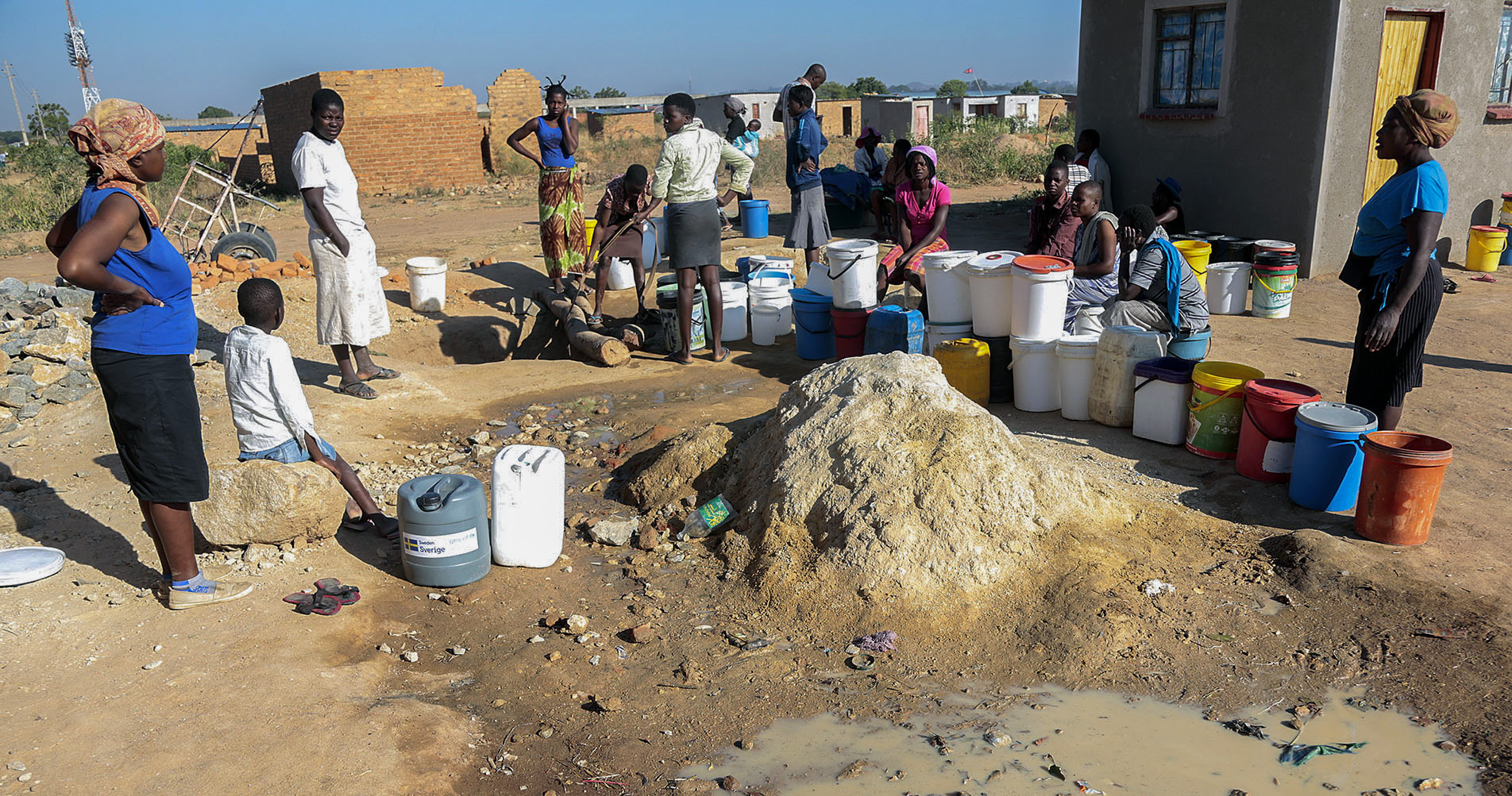 Zimbabwe Republic Police officers beat protesting Movement For Democratic Change supporters outside the party headquarters in Harare on 20 November 2019. The supporters were waiting for an address by party leader Nelson Chamisa before they were attacked. (Photo: EPA-EFE/AARON UFUMELI)
Zimbabwe Republic Police officers beat protesting Movement For Democratic Change supporters outside the party headquarters in Harare on 20 November 2019. The supporters were waiting for an address by party leader Nelson Chamisa before they were attacked. (Photo: EPA-EFE/AARON UFUMELI) 